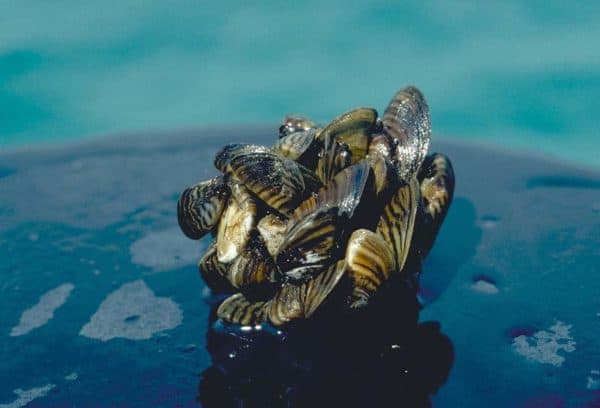BC conservation officers stop boat contaminated by invasive mussels


Conservation officers near Elko, British Columbia, have stopped a boat contaminated with invasive mussels from landing in B.C. waters.
The boat was being hauled from Ontario and had failed to stop at an inspection station, prompting officers to pull it over and issue a violation ticket. “This case is an excellent example of the importance of stopping at watercraft inspection stations to protect B.C.’s waters from invasive zebra and quagga mussels,” reports the B.C. Conservation Officer Service. “Invasive mussels were found during inspection and a complete decontamination of the watercraft was performed.”
To raise awareness of the environmental and economic damage caused by invasive plants and animals, the Province of B.C., in collaboration with the Invasive Species Council of B.C. (ISCBC), has proclaimed May as Invasive Species Action Month across the province, with a profile each week on one aspect of the issue – Week Two looks at invasive species in the garden and encourages backyard gardeners to be aware and report sightings of any from a list of 26 of horticulture’s most “unwanted” invasive plants, including Baby’s Breath and Butterfly Bush which, despite their delightfully inviting monikers, are ruthless displacers of native vegetation.
“It’s important for our government, our communities and individual British Columbians to take action to reduce the spread of invasive species in the province,” says Mary Polak, B.C. Minister of Environment. “We have made great strides in recent years and we will continue to work with invasive species committees and community groups to mitigate damage caused by non-native species in B.C.”
The inspection stations are a new tool in the provincial arsenal to prevent the incursion of species like zebra and quagga mussels, both of which have yet to be detected in B.C. waters according to provincial authorities. Native to Europe and first discovered in the Great Lakes in 1988 and 1989 respectively (brought across the Atlantic in ships’ ballast water), zebra and quagga mussels pose a threat to water quality, fish populations – such as that of the sockeye salmon -and to hydropower facilities, where they can clog pipes and water intake systems.
In March of this year, after a successful 2015 pilot project the province announced $2 million in annual funding to support the mussel defense program leading to the creation of eight permanent mussel inspection stations across the province at major entry points along B.C.’s borders with Alberta and the United States.
Already flourishing in Ontario, Quebec and Manitoba, zebra and quagga mussels can prove costly -the Pacific Northwest Economic Region has estimated an annual price of $500 million (USD) in damages within the Pacific Northwest. For the Great Lakes region alone, the United States Fish and Wildlife Service has projected an economic impact over the next decade of $5-billion (USD) to the U.S. and Canada.
“Invasive Species Action Month is an excellent opportunity for all of us to learn more about invasive plants and animals and the damage they can do to B.C.͛s ecosystems and infrastructure,” says B.C. Minister of Forests, Lands and Natural Resource Operations, Steve Thomson.

